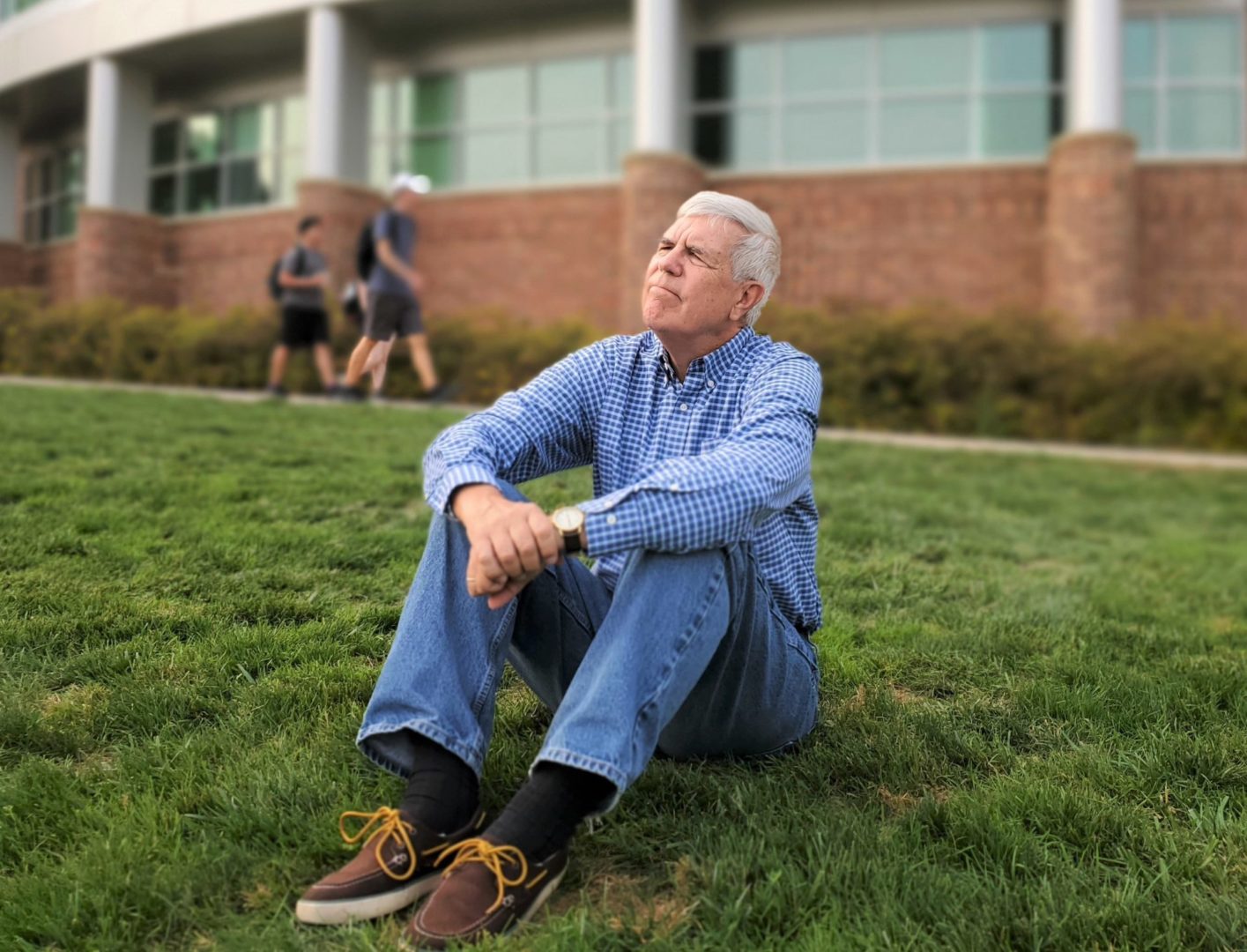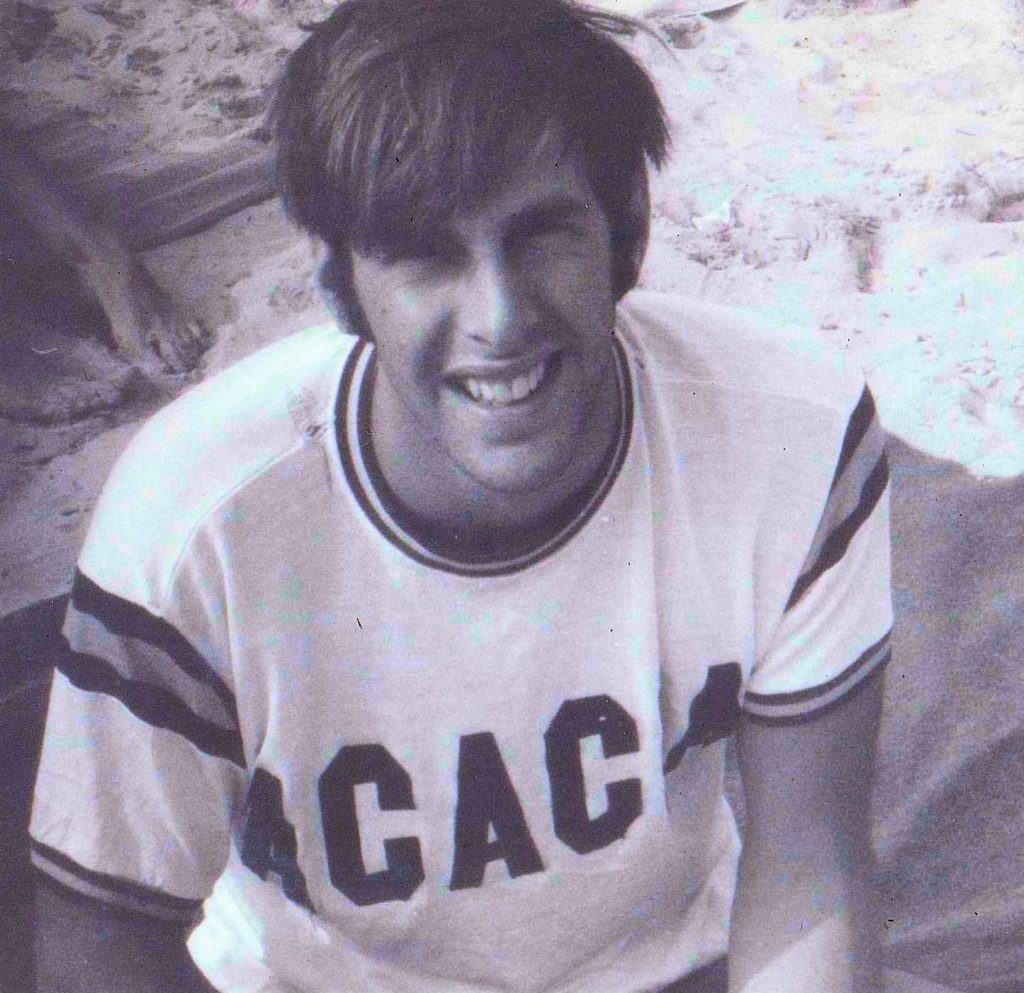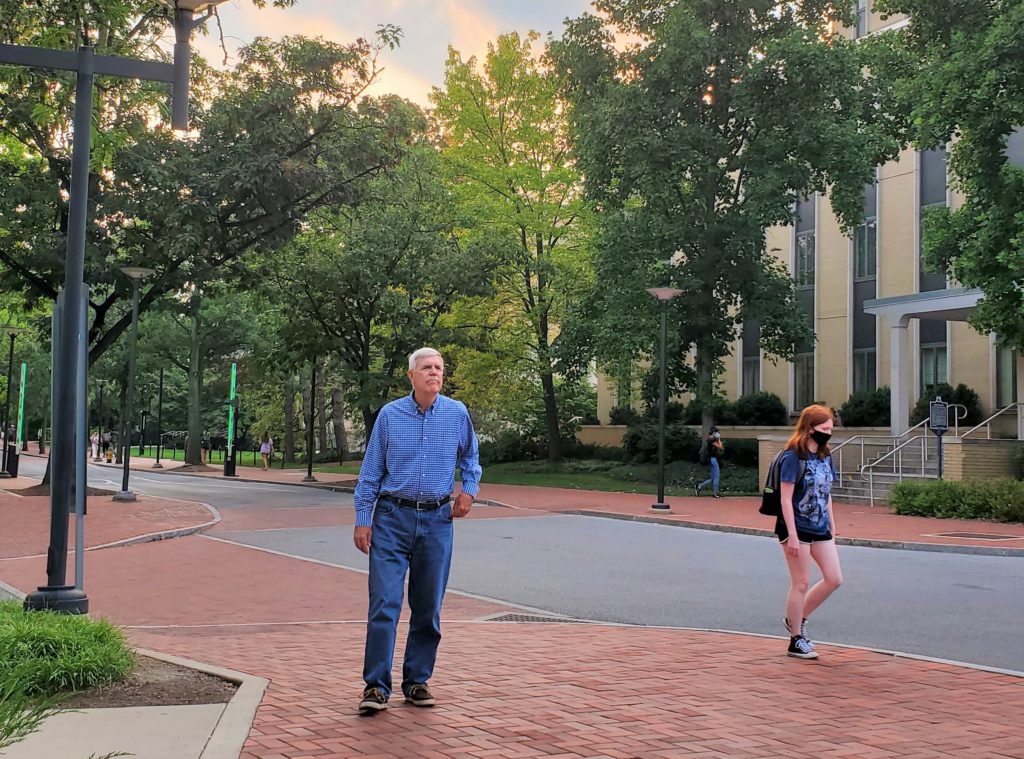
Bill Horlacher revisits the HUB Lawn nearly 50 years after his spiritual discovery.

Bill Horlacher revisits the HUB Lawn nearly 50 years after his spiritual discovery.
Few Happy Valley residents had reason to circle September 29, 1971 on their calendars. It was an ordinary Wednesday with unremarkable weather that produced little in the way of headlines. Only the Pittsburgh Pirates made big news by starting their game with a history-making lineup of nine Black players.
For me, however, that day stands out as the most important date of my lifetime. It was then, as a Penn State sophomore, that my life was forever changed.
I’m hesitant to say that I was “born again” 50 years ago this week. Not that I’m ashamed of the experience. Quite the contrary. But that phrase has been so twisted by political pundits and so sensationalized by television evangelists that it has become unclear and divisive.
Instead, I’d just like to share the simple, unembellished story of a State College townie who experienced spiritual transformation on the Penn State campus. Of course, if you’re averse to “religious” content there’s no pressure on you to read this—you’re not my insurance agent or my wife’s hairdresser.
REALITY OR REJECTION
My early years of adolescence, from 1965 to 1967, coincided with the peak years of conflict in Vietnam. While watching the nightly television news, I began to wonder about the statistical reports that originated with the Pentagon. If enemy casualties greatly exceeded U.S. casualties on a daily basis, why did victory seem so unattainable? Could it be that our government was misleading us? If so, were other institutions also stretching the truth—the schools, the corporations, the political parties, even the churches?
I didn’t become a protestor or a hippie as I muddled my way through adolescence. I never even sat on “The Wall” along College Avenue where local kids rubbed shoulders with free-spirited college students. But I did take on a skepticism that influenced my view of the Christian faith.
By age 15 or so, I had come to a philosophical fork in the road. Either the message of Jesus’ love and forgiveness was true and if so, it was the best “deal” on the face of the earth. Or that message was false, and it wouldn’t be worth a whit of my time.
PONDERING & PURSUING
Several helpful resources presented themselves for my faith inquiry. The first were the confirmation classes that I attended for several years at the church of my upbringing, Grace Lutheran.
I remember feeling a pious sense of sacrifice for attending a class on the Sunday evening when the first Super Bowl was held. (I got home in time to watch the final quarter of Green Bay’s win over Kansas City.) A more typical emotion, however, was a simple confusion over what to believe. Fortunately, Pastor Dale Bringman extended the grace to me that was emphasized in the church’s name, and he patiently offered answers to my questions. Perhaps a pushier pastor would have permanently turned me off.
And then there was the encouragement offered by the State College area Young Life club. This interdenominational group was growing rapidly during my high school years and I loved their meetings, especially the joyful music.
On one occasion, I invited my best high school buddy, Dean Linsky, to a Young Life rally at The Nittany Lion Inn. Dean put his faith in Jesus that night, beginning a commitment that ultimately led him into the pastoral ministry. As for me, I sat right beside my friend but was still unable to fully grasp the message of the gospel.
HUB CONVERSATIONS
After finishing high school, I went to college without going anywhere. My State High graduation took place in June of 1970—in Rec Hall—and my initial registration for classes at Penn State took place in September of 1970—in Rec Hall. But if all roads somehow led to Rec Hall for me, that was just fine. Even today, the Recreation Building holds so many rich memories that it is rivalled by only one other place as my favorite spot in Happy Valley.
That other happy place is the “HUB,” formally known as the Hetzel Union Building-Robeson Center. Much like Rec Hall, the HUB combines childhood and student memories. I played pinball games there as a kid; got my first job as a teenage busboy at the old Terrace Cafeteria, and often studied there during my freshman year of college. That last activity led to interesting conversations of a spiritual nature.
Several pairs of evangelical Christians offered to talk about their faith with me at the HUB, and I was delighted to interact with them. No wonder. I still had plenty of questions to ask about God, Jesus and the Bible, and these fellow students were eager to share their knowledge and convictions.
The most intriguing individual was Ellis Goldstein, an architecture major from the Philadelphia area. He told me that he grew up in the Jewish religious tradition and that he had received Jesus as his Messiah. In talking with Ellis, I gained an appreciation not only for his personal faith but also for the way he drew meaningful comparisons between the Old Testament and the New Testament.
FRATERNITY-BASED EXPOSURES
It was fine for me to live at home during my first year at Penn State, and that choice saved a lot of money. But I realized something needed to change if I wanted to taste real college life. I joined a fraternity at the end of my freshman year and prepared to move to the fraternity house for the fall quarter. My selection was Acacia, a brotherhood with a very positive reputation that Dean Linsky had also chosen.
What I didn’t know initially was that Acacia was the only one of Penn State’s 60-some fraternities with a visible group of evangelical Christians. Did I really choose Acacia or did God send me there?
Other priorities dominated my thoughts as I moved into the fraternity in early September, but the God-thing was still in the back of my mind. And so I engaged in conversations with Gary Eldred, a student leader in Campus Crusade for Christ, his roommate Al McCracken and, of course, Dean. Still, however, there was no sense of urgency in all of this. Most aspects of my earthly existence were OK and the concept of eternal life seemed irrelevant to a 19-year old in good health.
One day in mid-September as I was walking across campus, my mind wandered to the upcoming weekend and the fun I anticipated. But at that point, it was only Monday or Tuesday. And suddenly I was taken aback by a broader realization about my life. If every week of my life involved five stressful or boring days and just two days of fulfillment and fun, that would not be acceptable.
The solution? Perhaps I needed a “personal relationship with God,” a concept that Linsky, Goldstein, Eldred and McCracken had all mentioned to me.

HUB CONVERSION
And then it was September 29, 1971, the date I’ve already mentioned as the most important of my life. What exactly happened to me on that special day?
I don’t remember anything from the morning, but around noon I began talking with a fellow sophomore named Jan Wagner. Like many of the people I had recently met, she was a follower of Jesus. We sat down together on the HUB lawn, and as someone who had just identified himself as a 5-2 weekly loser, I was ready for any spiritual insights she could offer.
I’m pretty sure I told Jan that I believed in God—the only logical answer I could see for the existence of our precisely-designed natural world. And I think I also told her that I sensed God’s love for me through Scriptures I’d read and people I’d met.
But then I asked Jan a question that had perplexed me: “How does the death of Jesus on the cross have anything to do with sins I’ve committed?” She gave me a helpful answer, but my mind oddly wandered back to a term I heard from one of my high school teachers, Mrs. Sandy Welsh (the wife of Penn State assistant football coach George Welsh). It was Mrs. Welsh who first exposed my 10th grade history class to the word “ecology” and helped us begin to think about environmental protection.
ENVIRONMENTAL SPIRITUALITY?
I honestly hadn’t thought about ecology for a very long while. But now, from out of the blue, I decided that my sins could be described as spiritual pollution, and then I realized God could not allow anything like that into his heavenly presence. Somehow, this God who loved me would need to separate me from my sin before he could embrace me. Viewed from that vantage point, the sacrificial death of Jesus made perfect sense.
Looking back on things, I’m confident that I had already met the Lord through simple faith before leaving the HUB lawn. But I thought that perhaps I needed to somehow formalize my commitment, so I hurried back to the fraternity.
And that’s when I had a little experience that might have spooked me if it hadn’t thrilled me. As I sought to cross College Avenue from south of the HUB, I saw Pastor Bringman stopped at a traffic light. Not a big deal, you say. But I had always seen him in church; never once in any random encounter. Yet there he was, smiling and waving as I crossed the street in front of his car—at the precise time when I was poised to declare my faith in Jesus.
Moments later, I walked into the Acacia house and asked Gary Eldred for some pre-salvation preparation. He urged me to simply pray alone. So I went into my room and confessed my sins to the Lord, thanked him for his grace, and trusted Jesus to be my Savior. Did I feel any particular emotion? Just excitement and lots of that. As Al McCracken later wrote to me, “My memory of your acknowledging Jesus as your Lord was the ear-to-ear grin on your face.”
NO MORE #&%@!
Perhaps you’re wondering if any changes took place in my life. After all, Charles Spurgeon, the famous preacher of the 1800s, and C.S. Lewis, the author and apologist of the 1900s, both declared that a so-called conversion without any life change is fallacious.
As for me, the pre-faith Horlacher spoke the dialect of the campus which included some four-letter words. I realized that such language was always inappropriate and sometimes embarrassing, so I tried to stop it, with roughly the same results gained by many who try to stop smoking. But after September 29, 1971, profanity was banished from my vocabulary. And here’s the cool thing. It happened without any effort on my part. I did not even notice what had happened until one naughty word came forth a month later, and I was stunned to realize I hadn’t used that term in a long while.
More significantly, my life took on a new level of enthusiasm and joy. I will never forget one day, about two months after my spiritual discovery, when I left the fraternity around 7:45 a.m., bound for an 8 a.m. class. It was a Monday and the weather was cold and rainy, yet I was joyfully happily humming a Christian song. Wow, I really had been rescued from my five-bad-day, two-good-day rut.
Those were the immediate changes, along with a new hunger for the Bible and capacity to understand it. Other changes developed through the years, and I trust that more wisdom, more patience and more kindness are still forthcoming by God’s grace.

BACK TO THE HUB
Although I’m delighted to tell my story on this 50th anniversary of faith, I know it’s all about something that was done for me—not something that I accomplished. My role was limited to reading the gospel message in the Bible; only God could enable me to embrace it. As Jesus says in John 6:44, “No one can come to me unless the Father who sent me draws him. And I will raise him up on the last day.”
I lived away from Happy Valley for 38 years after graduating from Penn State, so it’s meaningful for me and my wife, Kathy, to be back here where my life was redirected. During the last few weeks, I’ve especially enjoyed some chances to talk with students in the HUB about my notable experience. It’s quite special to see the surprise on their faces when I point toward the lawn and say, “The most important event in my life took place 50 years ago, right over there.”
Receive all the latest news and events right to your inbox.

80% of consumers turn to directories with reviews to find a local business.